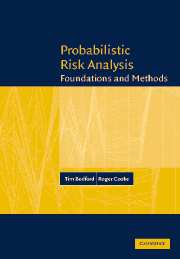1 - Probabilistic risk analysis
from Part I - Introduction
Published online by Cambridge University Press: 05 June 2012
Summary
Probabilistic risk analysis (PRA), also called quantitative risk analysis (QRA) or probabilistic safety analysis (PSA), is currently being widely applied to many sectors, including transport, construction, energy, chemical processing, aerospace, the military, and even to project planning and financial management. In many of these areas PRA techniques have been adopted as part of the regulatory framework by relevant authorities. In other areas the analytic PRA methodology is increasingly applied to validate claims for safety or to demonstrate the need for further improvement. The trend in all areas is for PRA to support tools for management decision making, forming the new area of risk management.
Since PRA tools are becoming ever more widely applied, and are growing in sophistication, one of the aims of this book is to introduce the reader to the main tools used in PRA, and in particular to some of the more recent developments in PRA modeling. Another important aim, though, is to give the reader a good understanding of uncertainty and the extent to which it can be modeled mathematically by using probability. We believe that it is of critical importance not just to understand the mechanics of the techniques involved in PRA, but also to understand the foundations of the subject in order to judge the limitations of the various techniques available. The most important part of the foundations is the study of uncertainty. What do we mean by uncertainty? How might we quantify it?
Information
- Type
- Chapter
- Information
- Probabilistic Risk AnalysisFoundations and Methods, pp. 3 - 14Publisher: Cambridge University PressPrint publication year: 2001
Accessibility standard: Unknown
- 1
- Cited by
